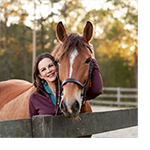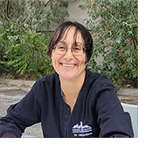Research Forum 2025 Agenda
Here are the planned sessions for ASPCA Research Forum 2025. Find full presenter bios below the schedule.
11:00 AM – 11:30 AM EDT
Keynote: It Really is Rocket Science
Presenter: Dr. Emily Weiss, Applied Animal Behaviorist and Strategist
11:30 AM – 12:15 PM EDT
Effects of Deferred Puppy Intake on Incidence of Canine Parvovirus Infection and Survival: A Community Case Study
Presenter: Dr. Hayley Hadden, DVM, Medical Director, Gigi’s
Many rural shelters depend on transferring clinically healthy puppies to other organizations, but this can risk spreading canine parvovirus (CPV) during transport and intake. In response to rising CPV cases at one rural partner shelter, a deferred intake protocol was introduced to reduce transmission risk. This presentation will explore the details of the protocol and attendees will learn about the implementation process, key outcomes, and survival rates associated with the new approach.
12:30 PM – 1:15 PM EDT
Fostering the Future: Kitten Caretaker Perspectives on Socialization and Support
Presenter: Dr. Courtney Graham, Assistant Professor, Ontario Veterinary College
Foster volunteers are vital to kitten development and adoption success, yet their perspectives are rarely studied. With kitten intake numbers rising, retaining these volunteers is critical. This presentation shares findings from a survey of 487 kitten foster caretakers, revealing key insights into current care practices, adaptations for fearful kittens, resource needs, and motivations to foster. Attendees will learn how shelters can use these insights to better support fosters and improve behavioral care for kittens.
1:30 PM – 2:15 PM EDT
Impact of Classical Conditioning (Quiet Kennel Exercise) on Barking in Shelter Dogs
Presenters: Dr. Jamirelis Carrero, DVM & Dr. Sara L Bennett, Clinical Assistant Professor of Veterinary Behavior, North Carolina State University
A major welfare concern in animal shelters is excessive barking from kenneled dogs. This contributes to noise pollution, can cause hearing damage, and has a negative impact on all animals within earshot. This study demonstrated that by implementing a simple classical counterconditioning exercise, consisting of instructing all ward passers-through to toss treats to each dog regardless of behavior exhibited, could change the emotional state of dogs from negative to more positive, thus reducing fear and frustration that often leads to excessive barking.
Data analysis showed that implementation of this simple exercise did reduce barking at clinically relevant levels even with a changing shelter population. Additionally, for each percent increase in compliance rate, there was an average decrease of 17.3 dB in the maximum decibel reading. Moreover, an overall positive change in attitude from most dogs towards visitors further showed the positive effects of the study.
2:30 PM – 3:15 PM EDT
Is 2-Dose Melarsomine as Safe and Effective as 3-Dose, in Heartworm Treatment Protocols that Include a Heartworm Preventive and Doxycycline? Two New Studies.
Presenter: Dr. Linda Jacobson, BVSc, PhD, Toronto Humane Society
Current American Heartworm Society guidelines recommend a three-dose melarsomine protocol along with additional therapies, but could a two-dose approach be just as safe and effective for dogs with Class 1 or 2 heartworm disease? This presentation explores a simplified treatment protocol that, if validated, could reduce costs, resource demands, and the duration of treatment and exercise restriction while maintaining effectiveness.
3:30 PM – 4:15 PM EDT
Your Next Best Friend?: National Survey Research on Humane Society Messaging Utilizing Artificial Intelligence
Presenters: Victoria LaPoe, Professor, Journalism, University of Cincinnati; Benjamin LaPoe, Ph.D., Assistant Professor Journalism, University of Cincinnati; Taylor Orcutt, Journalism and Political Science, Ohio University; and Adonis Durado, Associate Professor, Ohio University
This presentation explores a 2025 national study comparing AI-generated and human-created animal shelter messages, analyzing audience responses in terms of emotional engagement, trust, and intent to adopt. The research also considers factors like pet ownership, volunteer experience, and social media behavior to understand what drives public connection with shelter campaigns. The study provides actionable insights on how AI-generated content can be strategically deployed to strengthen messaging for animal adoption and community-based animal care. The presentation will offer practical communication strategies for promoting adoptions of dogs, cats, and other animals, with specific attention to visual design, message framing, and audience segmentation.
4:15 PM – 4:30 PM EDT
Closing Remarks
Meet the Presenters

As an Applied Animal Behaviorist, Dr. Weiss has worked with species as varied as lions, orangutans, elephants and Komodo dragons, as well dogs, cats and horses.
A nationally recognized scientist, Dr. Weiss has published extensively on topics related to applied animal behavior and human-animal interactions. She served as the ASPCA's VP. of Research & Development, overseeing groundbreaking research related to the animal sheltering field and developing assessment tools for shelter animals. Before that she created training programs to improve husbandry and decrease stress for zoo animals.
More recently Dr. Weiss led ASPCA's Equine Welfare efforts, with a focus on increasing the rehoming of horses, the development of effective safety net programming and effective law enforcement response to cruelty and neglect.
After sunsetting her successful career at the ASPCA, she is focusing on a few select projects where her knowledge, skills and talent can make a significant impact for animals.
In all of her work two central questions have driven her approach - Why? And - How do you know? These questions guide a consistent creative and scientific approach to the work of improving welfare.

Dr. Hayley Hadden, DVM, serves as Medical Director at Gigi’s, a dog shelter in Columbus, Ohio. She was co‑author of a pioneering 2025 study in the Journal of Shelter Medicine and Community Animal Health, demonstrating that delaying puppy intake at rural shelters significantly reduces parvovirus outbreaks. A graduate of The Ohio State University College of Veterinary Medicine, Dr. Hadden combines clinical leadership with evidence‑based shelter medicine innovation.

Dr. Graham is an Assistant Professor at the Ontario Veterinary College, where she also completed her PhD in Epidemiology and Companion Animal Behavior. Dr. Graham’s research interests include applied animal welfare and behavior, focusing on the behavioral development of kittens and the human-feline bond. Using a One Welfare framework, her research merges quantitative and qualitative methods, incorporating the perspectives of kitten caretakers to improve animal welfare and adoption outcomes.

Dr. Sara L. Bennett DVM, MS, DACVB, received her DVM degree in 2006 from Purdue University and later completed a residency in animal behavior with a focus on shelter medicine, obtained a master of science degree, and became certified as a diplomate of the American College of Veterinary Behaviorists in 2012. She spent time in specialty private practice and held a position as co-instructor for the University of Florida College of Veterinary Medicine Shelter Medicine Program, focusing on Shelter Animal Behavior and Welfare, for 8 years. She is currently a clinical assistant professor of clinical sciences in the behavior department at the College of Veterinary Medicine at North Carolina State University. Dr. Bennett particularly enjoys addressing problem behaviors in sheltered and rescued animals through clinical practice and research, thereby helping to protect animal welfare, making the sheltering experience less stressful, strengthening the human-animal bond, and increasing the likelihood that pets’ new homes become their forever homes.

Dr. Carrero earned her DVM degree in 2025 from NC State University. During veterinary school, she spent a summer conducting research with Dr. Sara Bennett, where she discovered a deep passion for using simple behavior modification techniques to help animals feel safer and more comfortable in both shelter and clinical environments. Her work resulted in the publication of her first paper, which she was honored to present at the 2024 Veterinary Behaviorist Symposium. Today, Dr. Carrero brings that same dedication and compassion to her role as a small animal veterinarian in Roanoke, Virginia, where she strives to make every patient’s visit a positive experience.

Dr. Jacobson received her veterinary degree in Pretoria, South Africa, in 1986 and subsequently completed a residency in small animal internal medicine, a PhD on the pathophysiology of virulent canine babesiosis and the University of Florida Online Certificate in Shelter Medicine. She is currently Director, Science and Advancement, at Toronto Humane Society. Professional interests include infectious diseases, animal hoarding and accessible veterinary care.

Victoria L. LaPoe, PhD., is an award-winning journalist and scholar whose research focuses on media sourcing, digital media, and public relations. She joined the University of Cincinnati in the fall of 2025. Prior to this role, she was a full professor in the E.W. Scripps School of Journalism at Ohio University, where she taught courses in both news and strategic communication (2017-2025), chaired the school’s contest committee, and served as Director of Studies in Journalism for the Honors Tutorial College (2020–2024).
Earlier in her academic career, Dr. LaPoe taught broadcasting at Western Kentucky University, where she served as overall coordinator for the broadcasting and film sequence (2014–2017).
She is a lifetime member of the Indigenous Journalists Association (formerly NAJA), where she was Vice President from 2017 to 2019 and has been a member of the organization’s education committee since 2015.

Ben received an M.S. in journalism from WVU in 2008 and a Ph.D. in media and public affairs from LSU in 2013. LaPoe's work focuses on the intersections of journalism, media, and politics. Ben has taught media writing, interactive storytelling, multimedia journalism, ethical community coverage in journalism, media advocacy, social media, intercultural communication, strategic political communications, quantitative research methods, civil rights tour, media law, and media history courses. A significant component of LaPoe's teaching philosophy is founded on helping students be adaptive, inquisitive individuals prepared to research and apply informed solutions in a constantly changing communications environment.

Taylor Orcutt is a journalism and political science student at Ohio University. A lifetime resident of Athens, Ohio, she has experience reporting on local, government, and law enforcement news for the Athens Messenger. Her scholarly interests include media and communications law, Indigenous media, and the intersections of both. She is a non-Indigenous Associate Member of the Indigenous Journalists Association, student member of the The Association of LGBTQ+ Journalists (NLGJA), and member of the Society of Professional Journalists.

Adonis Durado is an award-winning art director and Associate Professor in the School of Visual Communication at Ohio University, where he teaches design, art direction, and generative AI. He has garnered over 100 international awards for excellence in editorial design and advertising. His research explores AI-first pedagogy, place-based learning, and human–AI collaboration, bridging academic scholarship with professional practice and community engagement.
